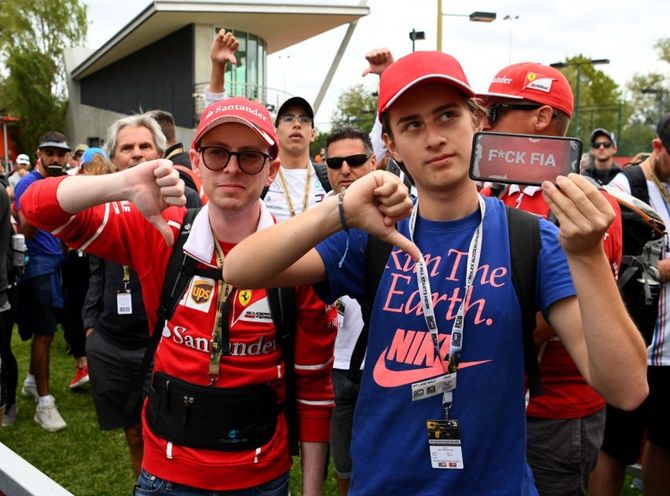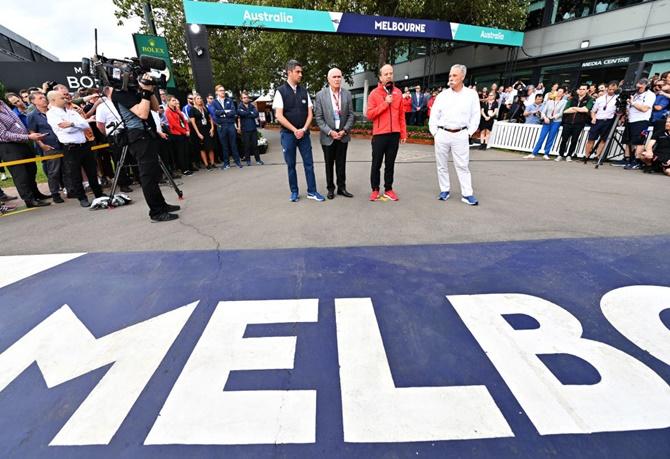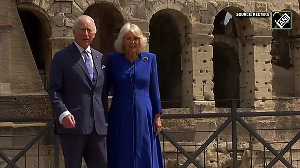Moody's changes Formula One's outlook to negative

Credit rating agency Moody's changed Formula One's outlook to negative from positive on Thursday to reflect the impact of the coronavirus crisis on a global sport that has yet to race in 2020.
Moody's did not rule out a full wipe-out of the season and said Formula One had the resources to withstand that eventuality.
"Formula One has strong liquidity and a sufficiently flexible cost base to manage through a severely curtailed 2020 season, which Moody's consider would likely be able to support a full cancellation," it said in a statement.
The Liberty Media-owned motor racing series cancelled its March 15 Australian opener, with May's showcase Monaco Grand Prix also axed, and has postponed six other races as countries go into lockdown.
Formula One bosses and the 10 teams hope to fire up the engines some time in the European summer with a reduced schedule of 15-18 races, but that remains uncertain as the virus spreads.
Former champions McLaren on Wednesday became the first F1 team to furlough staff and put drivers and senior management on reduced wages.
Moody's said it had affirmed the B2 corporate family rating and B2-PD probability of default rating of Alpha Topco Ltd, Formula One's holding company whose components generated revenues of $2 billion in 2019.
It said the rating reflected expectations for weakened earnings and cash flow generation, higher leverage and liquidity erosion as well as the company's cost flexibility and low capital spending.
Formula One had resilient cash flows due to multi-year contracts, added the note, as well as a track record of increasing its fan base.
Other factors included the timing of television contract renewals and the outcome of talks to renew the confidential 'Concorde' commercial agreement with teams and governing body that expires at the end of 2020.
"As of 31 December 2019, Formula One had substantial liquidity headroom of around $900 million, comprising $400 million cash balance and $500 million undrawn committed revolving credit facility," said the agency.
It expected that to be sufficient "to absorb cash outflows from potential refunds of advance payments from promoters, sponsors and broadcasters, team payments, other overheads and interest costs in the event that the 2020 season is cancelled."
There remained however a degree of risk, rated as low, that liquidity would not be enough.
Moody's said Liberty Media had substantial available resources to support Formula One but saw "a relatively high probability" F1 will breach a leverage covenant whose terms could be amended or waived.
"Moody's considers that Formula One is relatively well placed to recover post coronavirus crisis, underpinned by its contracted revenue nature, strong franchise, large fan base and high cash conversion."
It said a downgrade of the rating could happen if further disruption to the race calendar caused concerns about liquidity or if a renewed Concorde Agreement was negotiated with materially adverse terms for the company.
McLaren to put staff on furlough, F1 drivers take pay cut

McLaren became the first Formula One team to furlough staff because of the coronavirus on Wednesday, with drivers Lando Norris and Carlos Sainz joining senior management in taking a pay cut.
The sportscar maker said in a statement the temporary three-month wage reduction was part of wider cost-cutting measures due to the impact of the pandemic on its business.
"These measures are focused on protecting jobs in the short-term to ensure our employees return to full-time work as the economy recovers," McLaren added.
A team spokesman emphasised that 100-150 staff from across the group who were working on a "VentilatorChallengeUK" project were not included in the measure.
The group, including the luxury carmaker and applied technology arm, employs some 3,700 people with around 850 working for the F1 team.
McLaren is part of a consortium of leading aerospace, engineering and Formula One racing companies who have joined forces to ramp up production of a ventilator made by Smiths Group which supports those with complications from the virus.
Britain has ordered 10,000 of the breathing machines.
The majority of the Formula One team, who are currently on a three-week factory shutdown brought forward from August due to the season being on hold, will be furloughed from next week with McLaren making up some of the difference.
Those not furloughed, from McLaren Racing CEO Zak Brown downwards, will work on reduced pay.
The team spokesman said British 20-year-old Norris and Spaniard Sainz were adamant they too wanted to play their part.
With racing unlikely to start until the European summer at the earliest, F1 sources have said the teams -- a majority based in Britain -- are discussing extending the shutdown.
Non-essential businesses are shuttered in Britain because of the virus and the authorities have asked everyone to stay at home.
British finance minister Rishi Sunak announced last month that furloughed workers can claim 80% of their wages up to 2,500 pounds ($3,100) per month.
Top Premier League clubs have made use of the scheme, drawing criticism from politicians and others questioning the ethics of seeking public money while paying millions to players.
McLaren, whose Formula One team are the second most successful after Ferrari in terms of races and championships won, is majority owned by Bahrain's sovereign wealth fund Mumtalakat.
Formula One teams, unless owned by car manufacturers, derive much of their budget from the sport's revenues, prize money and sponsorship and face a major financial hit if races do not happen.
They have already agreed to defer major rule changes from 2021 to 2022 to cut costs and to race next year with the same cars.












 © 2025
© 2025